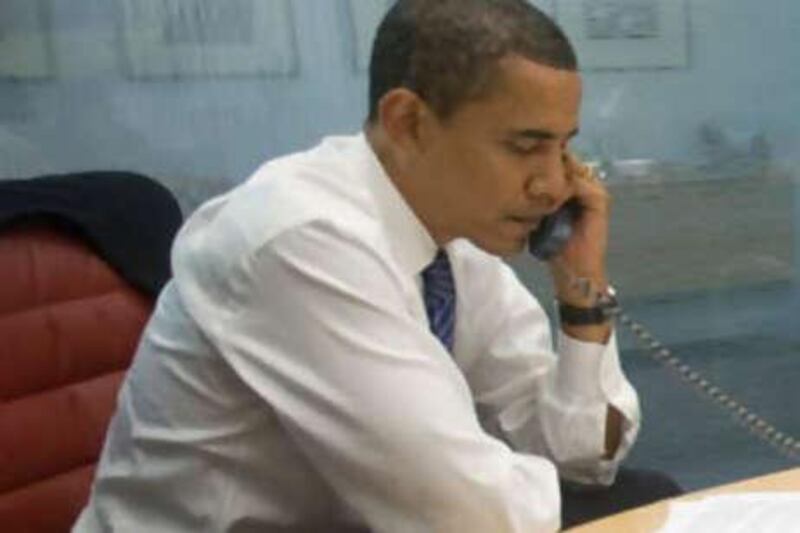CHICAGO // President-elect Barack Obama spoke to the Russian president Dmitry Medvedev as the future American head of state had another round of phone calls with leaders in other nations. A Kremlin statement said Mr Obama and Mr Medvedev "expressed the determination to create constructive and positive interaction for the good of global stability and development" and agreed that their countries had a common responsibility to address "serious problems of a global nature".
To that end, according to the Kremlin statement, Mr Medvedev and Mr Obama believe an "early bilateral meeting" should be arranged. Mr Obama's office did not issue a statement describing the call yesterday. A Kremlin spokesman declined to elaborate or say when such a meeting could take place. A Bush administration plan for setting up a missile shield close to Russia's borders has been a sore point with the Kremlin and has served as another dent in its battered relationship with the US.
On Wednesday, the day after Mr Obama's election, Mr Medvedev threatened to move short-range missiles to Russia's borders with Nato allies even as the US offered new proposals on nuclear arms reductions as well as missile defence. Allowing Russian observers at planned missile defence sites in Poland and the Czech Republic were among them, US officials said. During the presidential campaign, Mr Obama expressed scepticism about the system, and said it would require much more vigorous testing to ensure it would work and justify the billions of dollars it would cost.
Mr Obama's foreign policy adviser Denis McDonough said yesterday that Mr Obama had "a good conversation" with the Polish president Lech Kaczynski about the American-Polish alliance but that Mr Obama had made no commitment on the missile shield plan. "His position is as it was throughout the campaign, that he supports deploying a missile defence system when the technology is proved to be workable," Mr McDonough said.
That was in contrast to a statement issued by the Polish president. Mr Kaczynski said Mr Obama "emphasised the importance of the strategic partnership of Poland and the United States and expressed hope in the continuation of political and military co-operation between our countries. He also said that the missile defence project would continue." President George W Bush wanted construction of a European missile shield - installations would be in Poland and the Czech Republic - to begin before he left office in January with a completion date of 2012.
Experts in the Defence Department believe more interceptor testing is required, according to reports over the summer. Additional tests could delay the programme for years. Yesterday, the US Secretary of State Condoleezza Rice met with the Russian foreign minister Sergey Lavrov at an Egyptian Red Sea resort in an effort to ease escalating tensions in the waning weeks of the Bush administration. Mr Lavrov said Russia was not satisfied with the latest US proposals on nuclear arms reduction and missile defence and that positions expressed earlier by Mr Obama provide hope for a "more constructive" approach, Russian news agencies reported today.
*AP






